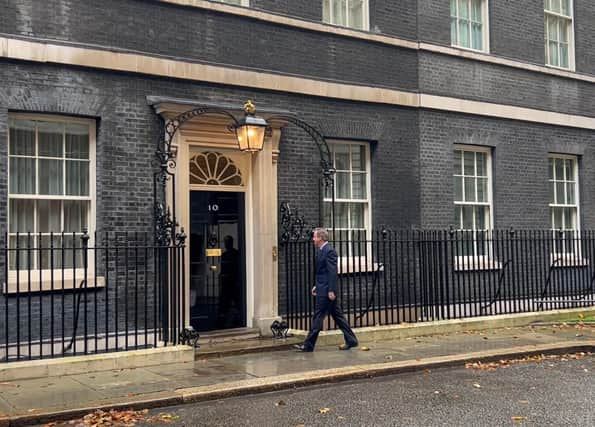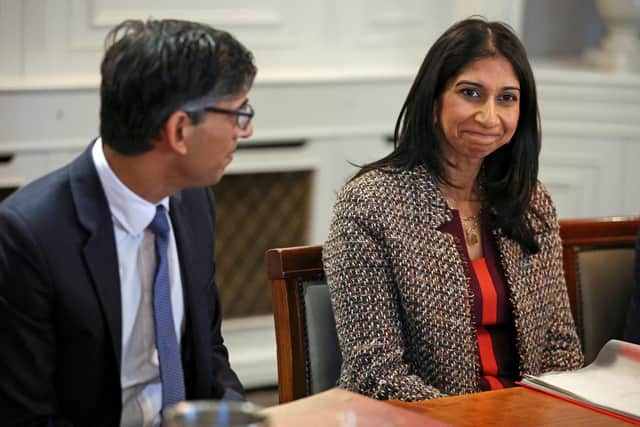Braverman sacked as David Cameron returns to Government as foreign secretary


The former Home Secretary had accused the Met police of not being impartial in its handling of pro-Palestine marches, and said some of the organisers “have links to terrorist groups, including Hamas” which she claimed was “disturbingly reminiscent of Ulster”.
Braverman has been replaced by James Cleverly – and in a surprise move - his position at the foreign office has been taken by the former prime minister David Cameron.
Advertisement
Hide AdAdvertisement
Hide AdCameron left government in 2016 in the wake of the Brexit referendum. He was accused by opponents of walking away from his responsibilities after the result didn’t go in his favour.
He returns as the government aims to take advantage of the opportunities for post-Brexit trade deals, and at a crucial time in world affairs with conflicts raging in the middle east and Ukraine. A key figure on the right of the Conservative Party, Braverman will now be free to pursue leadership ambitions. However, the appointment of David Cameron signals Sunak’s intent to return the party to the mainstream of British politics after the chaotic and short-lived Truss premiership.
In a statement posted on social media, Cameron said “While I have been out of front-line politics for the last seven years, I hope that my experience – as Conservative Leader for eleven years and Prime Minister for six – will assist me in helping the Prime Minister to meet these vital challenges”.
The former PM added: “Working to help ensure stability and security on the global stage is both essential and squarely in our national interest. International security is vital for our domestic security. Though I may have disagreed with some individual decisions, it is clear to me that Rishi Sunak is a strong and capable Prime Minister, who is showing exemplary leadership at a difficult time. I want to help him to deliver the security and prosperity our country needs and be part of the strongest possible team that serves the United Kingdom and that can be presented to the country when the General Election is held.”
Advertisement
Hide AdAdvertisement
Hide AdThe Conservative Party says the wider reshuffle strengthens Rishi Sunak’s team in Government “to deliver long-term decisions for a brighter future".Roughly a year out from a general election, eyes will be on how the right of the party responds to Braverman's sacking.


The Ulster Unionist Party leader Doug Beattie has told the News Letter that the decision to bring Cameron back into government highlights the position the Sunak government is in.
Mr Beattie said: "I feel the ongoing turmoil within the Conservative Party just further emphasises how low down the list of priorities Northern Ireland is to the current Government. What we need now is stable government at Westminster to lead the United Kingdom in difficult times.”
So far, it’s unclear whether there will be any changes in the Northern Ireland Office.
Advertisement
Hide AdAdvertisement
Hide AdThe Secretary of State for Northern Ireland Chris Heaton-Harris was a strong supporter of Boris Johnson and a member of the hardline European Research Group before taking the reins at the NIO. Since then, he has been a strong advocate of the Windsor Framework, but has seemingly made little progress in delivering enough for DUP to return to government at Stormont.
When the Framework was announced, Heaton-Harris said that “England, Scotland and Wales have been living free from EU rule, benefiting from increased trade with countries around the world and taking back control of our laws and borders.” He argued that the Windsor Framework eliminated “any sense of a border in the Irish sea” – despite the continuation of customs declarations, ongoing checks on many goods – and with regulations still set by the European Union.
Another former ERG member Steve Baker is currently NIO minister. Previously a Brexit minister under Theresa May, he quit over her Chequers proposals. In the NIO he has been a strong advocate for the Windsor Framework and for the return of the Executive. Earlier this year he claimed that the DUP were being held back by a “small number of opinion formers” who he said were “steering life in Northern Ireland to a degree not consistent with their status as unelected figures who merely express opinion, but put pressure on the DUP".